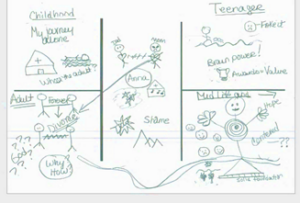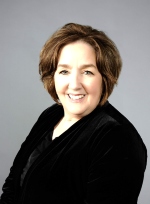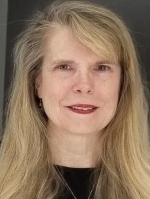 By Debbie Mattison, MSW, LMSW, OSW-C, FAOSW, and Sandy Blackburn, MSW, LSW
By Debbie Mattison, MSW, LMSW, OSW-C, FAOSW, and Sandy Blackburn, MSW, LSW
AOSW Spirituality SIG Co-leaders
Roadmaps, the old-school paper fold-out guide, may be outdated with GPS on most phones today, but maps have long been valuable visual reminders of a trip, a journey about where one started traveling and what they saw and experienced along the way to the next destination. Visual maps also provide opportunities, options, and hope about where one might want to go in the future.
All of us have experienced trips and unique life journeys that have brought us to where we are today. And as oncology social workers we have traveled with many patients on their unique journeys that started with a life-changing cancer diagnosis.
The Spirituality SIG was pleased to present a learning institute at the recent 40th AOSW Annual Conference, “Harnessing Spirituality in Practice: Moving Toward Whole Person Care for Our Patients and Ourselves.” The presentation acknowledged that while social workers often support exploring their patients’ spirituality, that in practice we don’t often do so. One common barrier to not exploring spirituality with our patients is that we haven’t explored our own spirituality. Our presentation focused on encouraging social workers to create a personal spiritual life map as awareness of our own spirituality can foster more impactful interactions with patients. Conference attendees participated in an experiential activity to create a spiritual life map that explored their own journey through life thus far. We used 15 short minutes to begin creating our life map providing these instructions:
- Break your life into year periods/stages (every 5-10 years): Childhood, teenager, young adulthood, mid adulthood and up or whatever fits for you.
- Use a format to show your life journey — a path, a road, a list and mark key positive and challenging events.
- Include drawings, symbols, representation of trials, experiences and how you coped.
- Use visual representations of hills, bumps, potholes, rain, clouds, valleys to describe the trip.
- Include spiritual/significant/peak moments of awe, joy, insights, meaning making, coping.
- Include experiences of love, connectedness, something bigger than yourself.
- Be creative — this is not about being artistic!
There is no right or wrong way to create a spiritual history map and no artistic talent is required, just a clean sheet of paper and a pen, or a blank computer screen. It is not about making “art” but checking in with your heart. Since spirituality is a broad concept that refers to connection, meaning, and purpose, an individual may identify life experiences including mountaintop moments, times they have felt most alive, or times of loss and sorrow as spiritual moments in the roadmap of their life. Here is one example of a life map:

The activity ended with participants sharing the impact of reflecting on and seeing their life mapped on one page. Participants noted seeing patterns and connections between events and experiences, their strengths, resilience, and insights about a valley or storm that ultimately brought them to where they are today. Overall, there was a strong sense of awe and gratitude about how they came to be an oncology social worker and what sustains them in this work. All from a one-page life map that took a relatively short amount of time to do!
Spiritual life maps can be a valuable tool in clinical practice. While the act of creating a life map may elicit a range of emotions, including recollections of trauma, periods of hardship or other challenges, they can also result in awareness of overcoming and experiencing transformation and growth along the way.
Mapping out important moments that are spiritually significant can help a person to connect with unforgettable moments of when faith or hope was lost or found, where disappointment or disaster was a low point, and where kindness, friendship, and love were high points. These maps may provide valuable clinical information about resources, beliefs and the strengths that could be used to cope with a cancer diagnosis or other unwelcome events. This life map activity could also be used in a variety of settings including individual counseling, support groups, as a life review or with interprofessional teams.
Suggested processing questions after the completion of a life map
- Would you tell me about your life map?
- What do you notice? Any patterns? Connections?
- What coping strategies do you see?
- What do you notice about your strengths?
- What does your life map tell you about yourself?
- What do you see as your assets?
- How might you apply these now?
- What do you hope for in the future based on what you see that you have experienced?
Whether used to review where we have been or charting the path ahead, creating a spiritual life map for ourselves or using it as a clinical tool with patients may foster meaning making, promote a reappraisal of earlier life events, help navigate a sometimes bumpy and unpredictable journey, and engender hope for the future.
Reference
Hodge, D. (2005). Spiritual life maps: A client-centered pictorial instrument for spiritual assessment, planning and intervention. Social Work, 50(1), 77-87.


